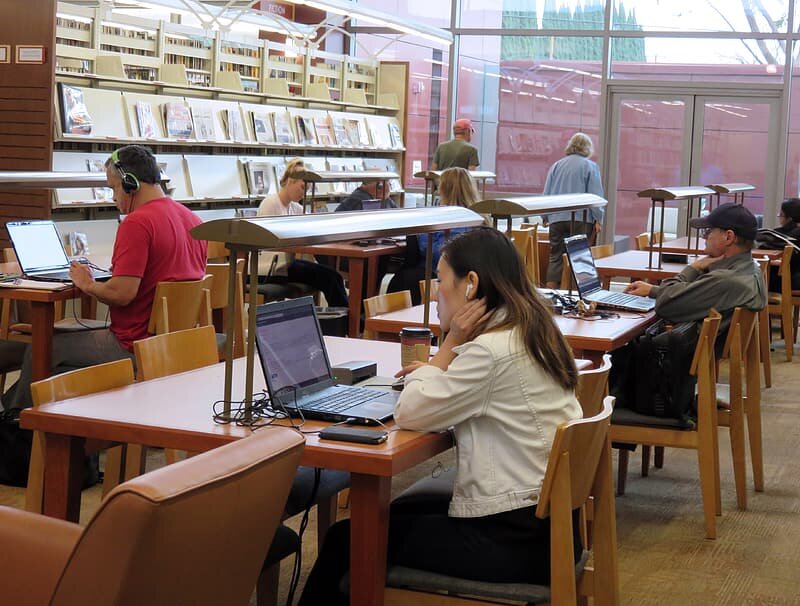Community College Leaders Hoping Men Return to College This Fall After Precipitous Drop During COVID
/Higher education officials at the community college level – in Connecticut and nationally – are anxiously awaiting the numbers as the new academic year begins.
National data comparing Fall 2000, in the midst of the pandemic, with Fall 2019, indicates that undergraduate male attendance fell the most at community colleges, where male enrollment declined more in every racial and ethnic group than female enrollment did, according to a recent article highlighting the issue, reported in the Chronicle of Higher Education.
Enrollment among Black men, for example, dropped 19% compared with a 9% drop among Black women. Among Hispanic men and women, the drop was 16.6% versus 6.2%. The data, developed by the National Student Clearinghouse Research Center, also found that among those of Asian descent, the year-to-year drop in enrollment was 8.1% among men and 0.9% among women. The enrollment drop was 14% among White men compared with less than half that percentage, 6.8%, among White women.
The Chronicle of Higher Education noted in a recent issue that “If men faced barriers to enrolling and staying in college before COVID-19, the pandemic – and a recent spate of police violence again Black Americans – has only amplified them. Students who were already struggling in high school fell further behind, unwilling or unable to engage in online learning. Boys of color who were already unsure they belonged in higher ed felt their sense of alienation and insecurity deepen. At the same time, many men felt a heightened pressure to work, after family members lost jobs during the recession.”
During the Spring semester nationally, 400,000 fewer males enrolled in college than in the spring of 2020, a drop nearly double that for females (203,000) data from the National Student Clearinghouse Research Center show. Once again, the Chronicle reported, the biggest losses and the widest gender gaps were at public community colleges, where male enrollment fell by 14.4% and female enrollment by 6 percent.
“We are losing a generation of men to COVID,” University of Southern California assistant professor of education Adrian H. Huerta told the Chronicle.
Overall enrollment at Connecticut’s 12 community colleges declined by 15% in 2020 compared with 2019 – the full-time and part-time enrollment dropped from 45,905 to 38,978. It marked the eighth consecutive year of enrollment decline, from 58,228 as recently as 2012, reflecting a 33% reduction in student enrollment. It was the lowest enrollment level in three decades, according to CSCU data.
Across Connecticut’s 12 community colleges, enrollment in 2019 was 59% female and 40% male, a breakdown that had essentially remained constant for a decade. The male percentage ranged from 27% at Capitol Community College and 35% at Northwestern Connecticut Community College to a high of 48% at Asnuntuck Community College. In 2020, the 12 community colleges enrollment was 62% female and 37% male.
In 2019, 18% of community college students in Connecticut were Black, 28% were Hispanic or Latino, 4% were Asian and 45% were White. In 2020, those numbers had changed slightly, to 16% Black, 27% Hispanic or Latino, 4% Asian and 45% White. A decade ago, in 2010, 16% of students were Black, 18% were Hispanic or Latino, 3% were Asian and 59% were White.
“It’s concerning because I worry, and a number of us who work with the community colleges are really worried, about exacerbating existing inequities when it comes to higher education if we lose these students,” Alison Buckley, Connecticut State Colleges and Universities vice president for enrollment management, told the CT Mirror last fall.
In an effort to provide financial assistance to students who may have been adversely impacted by the pandemic, CSCU announced in July 2021 that debt which community college students took on or could not repay because of the pandemic will be forgiven.
Paid for with federal Higher Education Emergency Relief Fund (HEERF) money, the forgiveness affects all account balances that resulted from enrollment in summer 2019 through spring 2021 semesters. All registration holds related to these outstanding balances have been removed.
“Community college students have been hit especially hard by COVID-19,” explained CSCU President Terrance Cheng, who was appointed to the position earlier this year. “By eliminating the debt those students owe to institutions, we are removing a hurdle that prevents far too many people from continuing their educational journeys. Our message to students is simple: you now have a clean slate, so if an account balance was standing in your way, you can now register for classes for the fall semester.”
The debt relief will impact 18,161 current and former students, according to CSCU. A total of approximately $17 million will be forgiven. There are no conditions attached, and students are not required to enroll in classes in any future semesters. However, officials hope they do enroll.
And they will be watching the numbers as the new academic year gets underway.
































